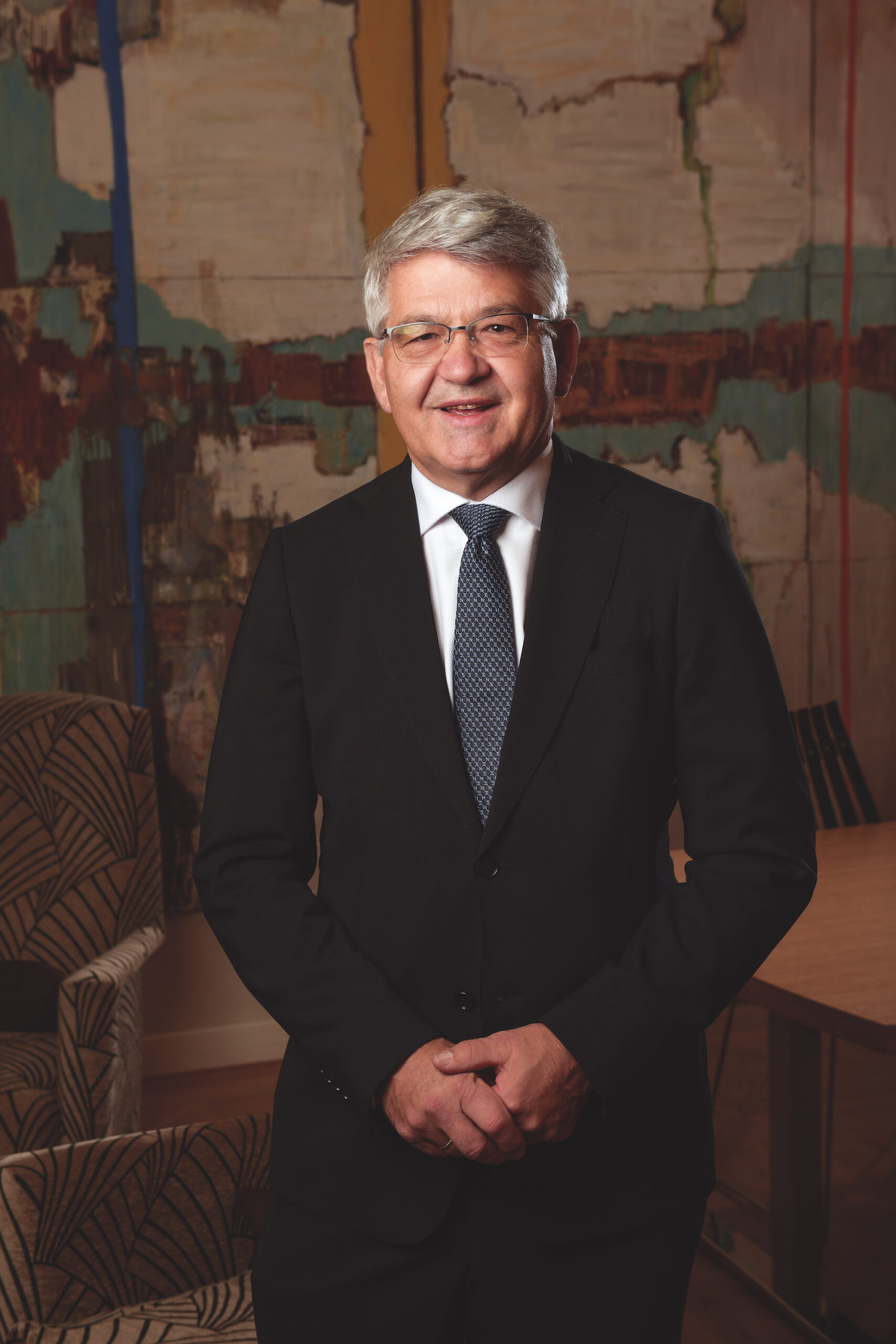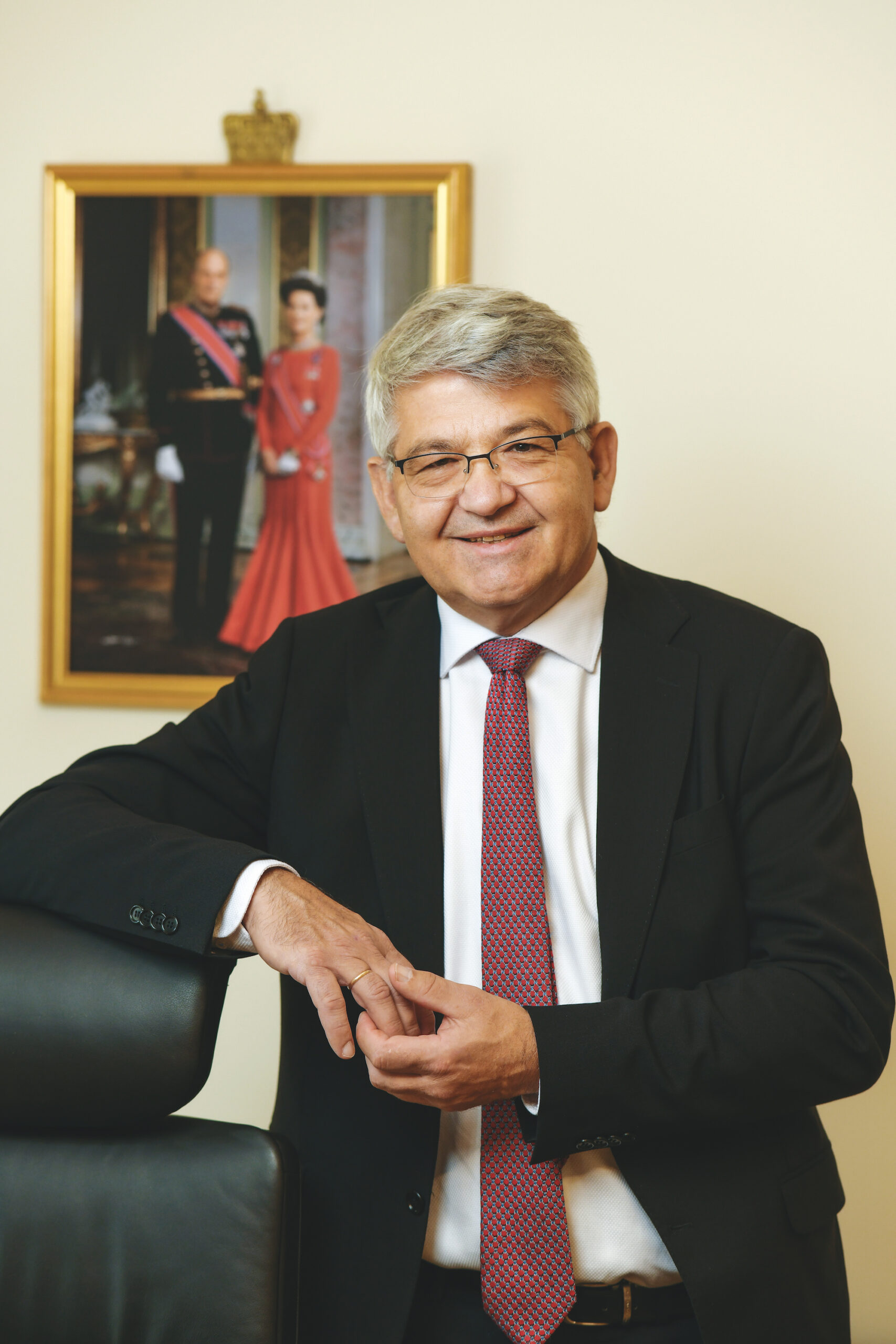“Our success depends on the success of the EU”

H.E. Victor Conrad Rønneberg, Ambassador of Norway
Text: Martina Hošková and M. Zisso; Photo: Pavel Matela
Arriving in the Czech Republic at the time of the Czech EU Presidency last September gave H.E. Mr. Victor Conrad Rønneberg, Ambassador of Norway, “a flying start” as he nicely puts it. “Flying” seems to also be a fitting description of our interesting interview, where he manages to directly address all topics raised. You can look forward to finding out about his knowledge of the Czech language, Norwegian gas and seafood in Czechia and Škoda cars in Norway, EEA and Schengen agreements, and unfortunately also about the Russian aggression towards Ukraine.
How did you become an ambassador?
I have been a diplomatic adviser for most of my working life – in the Norwegian Parliament, in the Office of the Prime Minister, and in the Foreign Service. After having worked at various levels in several countries, I found it natural to seek ambassadorial postings.
Being an ambassador is an honour and a privilege. Being an ambassador to the Czech Republic is especially satisfying due to the country’s rich culture, beautiful cities, and friendly people. The fact that the relations between Norway and the Czech Republic are broad and problem-free makes the posting here in Prague exceptionally rewarding for me.
You arrived in the Czech Republic last September. Can you share some of your impressions so far?
The Czech EU presidency gave me a flying start, with numerous political visits from Norway. I would like to commend Czechia on its very successful presidency. The way you steered the EU during an extremely challenging period is very impressive.
I have also, with great interest, closely followed the presidential election and the honourable change of Head of State.
Furthermore, I have used my first few months to learn more about Czech society through visits to different parts of the country, and through meeting people from various segments of society. The numerous new contacts I have made reinforce my impression that Czechs and Norwegians are quite likeminded; having much of the same humour, sharing their interests of sports and outdoor activities, showing solidarity with the less fortunate, believing in freedom and democracy, and being willing to defend our common values and support those that are defending theirs.
I have even started taking Czech lessons, but I must admit that it will still take some time until I command this exceptional language.

H.E. Victor Conrad Rønneberg, Ambassador of Norway
You say that Czechs and Norwegians are quite likeminded. Do our bilateral Czech-Norwegian relations reflect that?
Today’s bilateral relations between the Czech Republic and Norway are both broad and very close. We are partners in Europe, work closely together in the UN and many other international organizations, and are allies in NATO.
Our trade last year amounted to CZK 85 billion, with Norwegian gas and seafood being the major imports to the Czech Republic, while Škoda cars dominated Czech export to Norway. In Norway, over 90% of all new cars are electric, and Škoda Enyaq is a bestseller. In fact, I myself have an Enyaq for private use, and we also have one at the Embassy, so I can testify that Škoda really produces great EVs.
Quite a few Norwegian companies; such as Orkla Foods, Jotun, and Sapa Aluminium; are present in the Czech Republic, and the Norwegian Oil Fund has made substantial investments in the country, particularly in the property sector.
The Czech Republic is a popular destination for Norwegian tourists. Before the pandemic, approximately 70,000 Norwegians visited Czechia annually, and we are now getting closer to that number again. Many Czechs also visit Norway, particularly the countryside, where you often find Czechs off-piste skiing, parasailing, river kayaking, and mountain climbing.
There is also a strong cultural cooperation between our countries. Norwegians very much enjoy Czech music and art, and Czechs seem to like Norwegian literature and film. Many dozen Czechs study Norwegian, and more than 150 Norwegians study, mostly medicine, at Masaryk and Charles Universities and at the University of Hradec Králové. Furthermore, the EEA and Norway Grants have encouraged bilateral cooperation in several different areas.
Can you tell us more about the EEA and Norway Grants?
The EEA and Norway Grants are the contribution of Norway (and also Iceland and Lichtenstein) towards reducing economic and social disparities, and strengthening bilateral relations with the recipient countries. Since 2004, the Grants have supported 1,700 projects in the Czech Republic, valued at more than CZK 10 billion. The cooperation covers areas such as research and innovation, environmental protection, cultural cooperation, public health, education, and the justice sector. Great emphasis is given to human rights issues, including support of the LGBT+ community and Roma inclusion.
The present program period is shortly coming to an end, and Norway and the other two contributing countries are presently negotiating the terms of the new period with the EU, which in turn will be followed up by an agreement with the Czech Republic.
It is important to note that, although not a member of the European Union, Norway is more integrated into the European economy through the EEA and Schengen agreements than most EU member countries. Our success depends on the success of the EU, and we do what we can to underpin a strong and united Europe.
How has the Russian war in Ukraine affected Norway?
The unprovoked Russian aggression towards Ukraine was also a surprise for Norway. Norway is bordering Russia, and for the past 25 years there has been extensive cooperation across the border, from student and cultural exchanges to environmental protection and business cooperation. Today, the border is de facto closed and almost all cooperation ceased; the Norwegian Consulate General in Murmansk has shut down. As late as last month, Norway expelled 15 so- called Russian diplomats. Norway has also supported the suspension of Russia from the Artic Council, and from other regional arrangements in the High North. We condemn the Russian invasion of Ukraine and the increasing totalitarianism in Russia. Norway stands united with the EU and other Allies in forcing Russia to give up its imperial ambitions, and to live up to its international obligations. To this end, we have approved all EU sanction packages and other measures against Russia.
Norway has further maximized our gas production to help compensate for the abolition of Russian gas. Today, we are Europe’s biggest gas supplier, and provide over a quarter of all gas to the EU. Hence, Norway also provides a large part of Czechia’s gas. To secure the reliability of supplies, we have, together with our Allies, also taken several steps towards protecting the sub-sea energy infrastructure in Northern Europe, including 8,000 km of pipelines.
We are not only supporting Ukraine politically, but Norway is also a major supplier of military and humanitarian aid to Ukraine. Last year, we provided more than CZK 20 billion to Ukraine and other countries in the region. Earlier this year, the Norwegian parliament agreed on a five-year aid package to Ukraine and Moldova, worth CZK 150 billion.
This interview is done on the occasion of the National Day of Norway. What are your wishes for Norway? And for the Czech Republic?
On the 17th of May we celebrate the Norwegian Constitution, which is the third oldest in the world. The 1814 Constitution ensures Norway’s independence, and has laid the foundation for our democracy and prosperity. We have since learned that freedom, justice, and democratic rights cannot be taken for granted, but must be nurtured and defended if they are to be preserved.
We are presently engaged in a broad struggle, testing whether these values can endure. Spearheading this struggle today is Ukraine. My wish for both Norway and the Czech Republic is that our countries have the will to continue supporting the Ukrainian people in their unwavering and courageous fight for their own, as well as our, freedom and democratic way of life.


[…] Read the interview with H.E. Victor Conrad Rønneberg from Summer 2023. […]